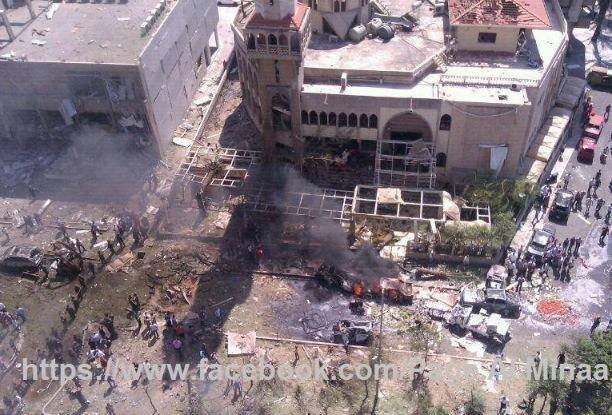Following the terrorist blasts that rocked the Lebanese northern city of Tripoli, world countries rushed to condemn the attack which targeted worshippers after their Friday prayers, except Kingdom of Saudi Arabia.
 Following the terrorist blasts that rocked the Lebanese northern city of Tripoli, world countries rushed to condemn the attack which targeted worshippers after their Friday prayers, except Kingdom of Saudi Arabia.
Following the terrorist blasts that rocked the Lebanese northern city of Tripoli, world countries rushed to condemn the attack which targeted worshippers after their Friday prayers, except Kingdom of Saudi Arabia.
The Arab kingdom officials even failed to talk about the incident, despite it dubs itself a major regional power and a reference to Muslims.
The United Nations condemned the double car bomb blasts as the 15-member council appealed to all Lebanese people to preserve national unity in the face of attempts to undermine Lebanon's stability.
Separately, U.N. Secretary-General Ban Ki-moon urged Lebanese citizens to "exercise restraint, remain united and to support their state institutions," particularly Lebanon's security forces.
The United States embassy in Lebanon extended its "deepest condolences for the loss of innocent life," reiterating the United States’ "condemnation in the strongest terms of any violence in Lebanon" and urging all parties to "exercise calm and restraint."
Regionally, Kuwait urged its citizens on Friday to “immediately” leave Lebanon, lamenting the recurrence of blasts in the country.
"We call on all Kuwaitis present in Lebanon to immediately leave the country,” an official source in the Ministry of Foreign Affairs said in a released statement.
He added: “We also urge Kuwaiti nationals to avoid traveling to the country.”
The statement “strongly” condemned the attacks that targeted worshipers in the northern city of Tripoli.
"We are deeply sorry for the death of innocent people and for the recurring blasts taking place recently and threatening stability and security in this neighboring country.”
The Arab state urged the Lebanese to be wise and protect Lebanon from any possible regional repercussions.
Meanwhile, the United Arab Emirates expressed its concern over Tripoli's deadly explosions.
"We strongly condemn the terrorist attacks that targeted Lebanon's security and stability,” Minister of Foreign Affairs Dr. Anwar Mohammmad Gargash said in a released statement.
"These bombings aim at inciting sedition between the different factions in Lebanon and at threatening the country's national unity, particularly in this critical stage in the region.”
Gargash called on the Lebanese to “work in solidarity to defuse sedition.”
For his part, Secretary General of the Gulf Cooperation Council (GCC) Abdullatif Al-Zayani condemned on Saturday the “terrorist” blasts that rocked Lebanon's Tripoli.
“Targeting worship places and innocent people is a vile criminal action,” al-Zayani said in a statement issued late on Friday.
He described the blasts as “a cowardly attempt to undermine the peaceful co-existence in Lebanon,” considering that it is an to “embroil the people of the country in hateful sectarian sedition.”
Meanwhile, Iran denounced on Saturday the powerful blasts that rocked the northern city of Tripoli, pointing out that Tehran will not allow “terrorism” to threaten Lebanon's stability and security.
Deputy Iranian Foreign Minister for the Arab and African Affairs Hussein Amir Abdul-Lahian pointed out in comments to IRNA news agency that the explosions that hit Tripoli came after an earlier strike by Israel on the area of Naameh south of Beirut.
“There is coordination between Israel and the takfiri groups,” the Iranian official stated.
Syria, EU, Russia and several other states also denounced the blasts.
The Saudi kingdom also didn't condemn the Dahiyeh blast which rocked Ruwais neighborhood last week, and left 27 martyrs and more than 300 injured.
Earlier on Friday, around 45people were killed and more than 500 others wounded in twin bombings that targeted two mosques in Tripoli.